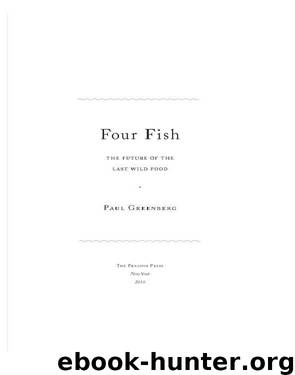Four Fish by Paul Greenberg

Author:Paul Greenberg
Language: eng
Format: epub
Publisher: Penguin Group (USA), Inc.
Published: 2010-06-23T16:00:00+00:00
With fish, though, hope must always be put in context. Around the time of the North American cod crises and the passage of the Sustainable Fisheries Act, Daniel Pauly, known as the most iconoclastic of leading contemporary marine biologists, coined the term “shifting baselines.” When I came across the concept a little while back, I was struck by both its profound significance as well as its relative invisibility in the contemporary news cycle. Ghettoized within the insular realm of fisheries science, the theory has profound implications as a sociological phenomenon as much as a biological one.
The idea of shifting baselines is this: Every generation has its own, specific expectations of what “normal” is for nature, a baseline. One generation has one baseline for abundance while the next has a reduced version and the next reduced even more, and so on and so on until expectations of abundance are pathetically low. Before Daniel Pauly expressed this generational memory loss as a scientific thesis, the fantastical catches of older fishermen could be written off as time-warped nostalgia. But Pauly has tabulated the historical catch data and shown that the good old days were in fact often much better. This is not nostalgia on the part of the old or lack of empathy on the part of the young. It is almost a willful forgetting—the means by which our species, generation by generation, finds reasonableness amid the irrational destruction of the greatest natural food system on earth.
My baseline, up until I started looking into codfish, was that codfish are fundamentally a fish that comes from far away, abundant on the slope of the continental shelf, a minimum of a two- to four-hour steam from land, and commercially pursued by distant offshore fleets. But as I started to look into codfish more closely, I was to come to realize that my baseline was considerably shifted from what nature had initially provided.
It turns out that codfish on Georges Bank and other offshore areas are populations of last resort—the head office of the cod operation with all its subsidiary franchises removed. And to a large extent the future of our codfish populations comes down to the question of whether humans can reconstruct a memory of the pattern of abundance and apply it to the future.
As Pauly’s shifting baselines show, perceptions of abundance in human experience are relative. Even I doubted the existence of a cod shortage during my fishing trip to Georges Bank, because every time I dropped a jig to the bottom, a cod seemed to come up on my line. The modern marine conservationist must work against this limited perception and persuade fishermen that their immediate concept of abundance is a diminished one. Mark Kurlansky’s Cod did this in a layman’s way, creating a benchmark for a general readership that gives some evidence of the past abundance of cod. Science, though, requires more rigor and precision to quantify memory—a census, so to speak, not of the present but of the past. It was just such a census that a Maine fisherman named Ted Ames took up in 1999.
Download
This site does not store any files on its server. We only index and link to content provided by other sites. Please contact the content providers to delete copyright contents if any and email us, we'll remove relevant links or contents immediately.
| Fisheries & Aquaculture | Forests & Forestry |
The Lonely City by Olivia Laing(4799)
Animal Frequency by Melissa Alvarez(4463)
All Creatures Great and Small by James Herriot(4311)
Walking by Henry David Thoreau(3953)
Exit West by Mohsin Hamid(3824)
Origin Story: A Big History of Everything by David Christian(3687)
COSMOS by Carl Sagan(3618)
How to Read Water: Clues and Patterns from Puddles to the Sea (Natural Navigation) by Tristan Gooley(3466)
Hedgerow by John Wright(3354)
How to Read Nature by Tristan Gooley(3335)
The Inner Life of Animals by Peter Wohlleben(3311)
How to Do Nothing by Jenny Odell(3294)
Project Animal Farm: An Accidental Journey into the Secret World of Farming and the Truth About Our Food by Sonia Faruqi(3216)
Origin Story by David Christian(3195)
Water by Ian Miller(3179)
A Forest Journey by John Perlin(3069)
The Plant Messiah by Carlos Magdalena(2927)
A Wilder Time by William E. Glassley(2859)
Forests: A Very Short Introduction by Jaboury Ghazoul(2836)
